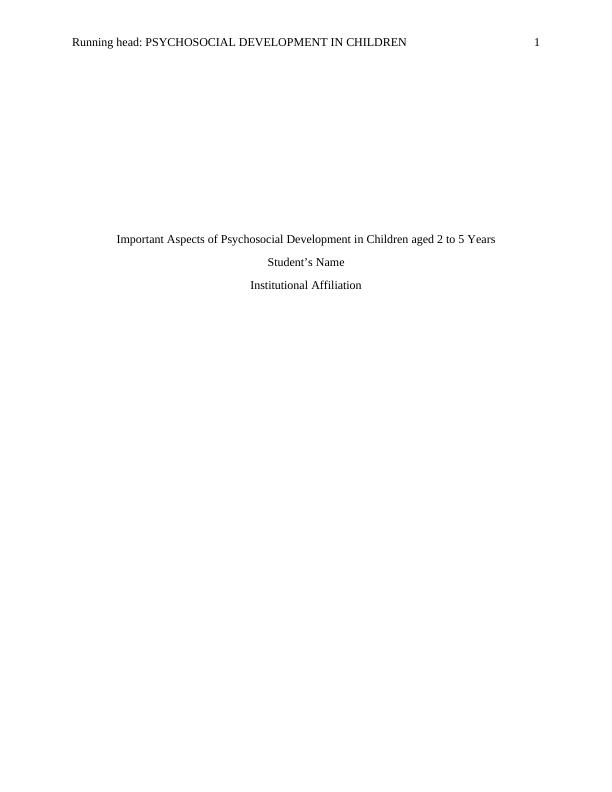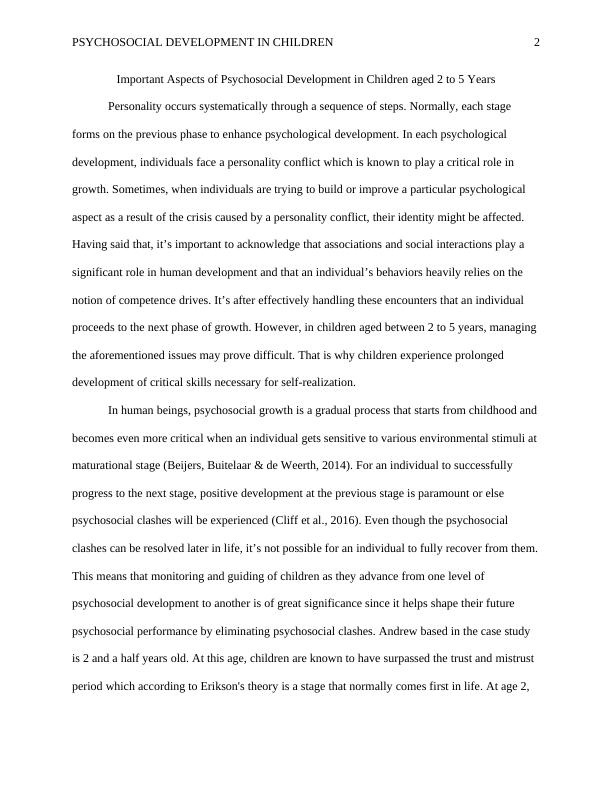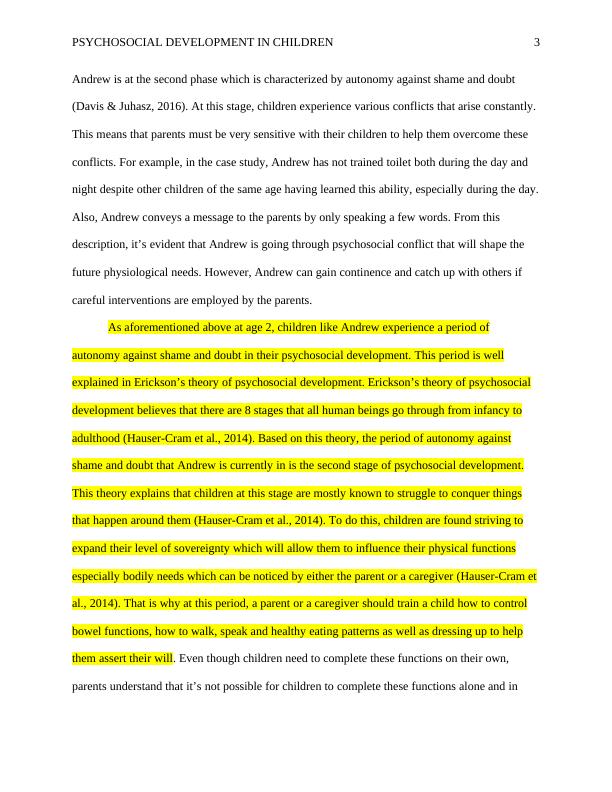Important Aspects of Psychosocial Development in Children aged 2 to 5 Years
Added on 2022-10-15
9 Pages2093 Words379 Views
Running head: PSYCHOSOCIAL DEVELOPMENT IN CHILDREN 1
Important Aspects of Psychosocial Development in Children aged 2 to 5 Years
Student’s Name
Institutional Affiliation
Important Aspects of Psychosocial Development in Children aged 2 to 5 Years
Student’s Name
Institutional Affiliation

PSYCHOSOCIAL DEVELOPMENT IN CHILDREN 2
Important Aspects of Psychosocial Development in Children aged 2 to 5 Years
Personality occurs systematically through a sequence of steps. Normally, each stage
forms on the previous phase to enhance psychological development. In each psychological
development, individuals face a personality conflict which is known to play a critical role in
growth. Sometimes, when individuals are trying to build or improve a particular psychological
aspect as a result of the crisis caused by a personality conflict, their identity might be affected.
Having said that, it’s important to acknowledge that associations and social interactions play a
significant role in human development and that an individual’s behaviors heavily relies on the
notion of competence drives. It’s after effectively handling these encounters that an individual
proceeds to the next phase of growth. However, in children aged between 2 to 5 years, managing
the aforementioned issues may prove difficult. That is why children experience prolonged
development of critical skills necessary for self-realization.
In human beings, psychosocial growth is a gradual process that starts from childhood and
becomes even more critical when an individual gets sensitive to various environmental stimuli at
maturational stage (Beijers, Buitelaar & de Weerth, 2014). For an individual to successfully
progress to the next stage, positive development at the previous stage is paramount or else
psychosocial clashes will be experienced (Cliff et al., 2016). Even though the psychosocial
clashes can be resolved later in life, it’s not possible for an individual to fully recover from them.
This means that monitoring and guiding of children as they advance from one level of
psychosocial development to another is of great significance since it helps shape their future
psychosocial performance by eliminating psychosocial clashes. Andrew based in the case study
is 2 and a half years old. At this age, children are known to have surpassed the trust and mistrust
period which according to Erikson's theory is a stage that normally comes first in life. At age 2,
Important Aspects of Psychosocial Development in Children aged 2 to 5 Years
Personality occurs systematically through a sequence of steps. Normally, each stage
forms on the previous phase to enhance psychological development. In each psychological
development, individuals face a personality conflict which is known to play a critical role in
growth. Sometimes, when individuals are trying to build or improve a particular psychological
aspect as a result of the crisis caused by a personality conflict, their identity might be affected.
Having said that, it’s important to acknowledge that associations and social interactions play a
significant role in human development and that an individual’s behaviors heavily relies on the
notion of competence drives. It’s after effectively handling these encounters that an individual
proceeds to the next phase of growth. However, in children aged between 2 to 5 years, managing
the aforementioned issues may prove difficult. That is why children experience prolonged
development of critical skills necessary for self-realization.
In human beings, psychosocial growth is a gradual process that starts from childhood and
becomes even more critical when an individual gets sensitive to various environmental stimuli at
maturational stage (Beijers, Buitelaar & de Weerth, 2014). For an individual to successfully
progress to the next stage, positive development at the previous stage is paramount or else
psychosocial clashes will be experienced (Cliff et al., 2016). Even though the psychosocial
clashes can be resolved later in life, it’s not possible for an individual to fully recover from them.
This means that monitoring and guiding of children as they advance from one level of
psychosocial development to another is of great significance since it helps shape their future
psychosocial performance by eliminating psychosocial clashes. Andrew based in the case study
is 2 and a half years old. At this age, children are known to have surpassed the trust and mistrust
period which according to Erikson's theory is a stage that normally comes first in life. At age 2,

PSYCHOSOCIAL DEVELOPMENT IN CHILDREN 3
Andrew is at the second phase which is characterized by autonomy against shame and doubt
(Davis & Juhasz, 2016). At this stage, children experience various conflicts that arise constantly.
This means that parents must be very sensitive with their children to help them overcome these
conflicts. For example, in the case study, Andrew has not trained toilet both during the day and
night despite other children of the same age having learned this ability, especially during the day.
Also, Andrew conveys a message to the parents by only speaking a few words. From this
description, it’s evident that Andrew is going through psychosocial conflict that will shape the
future physiological needs. However, Andrew can gain continence and catch up with others if
careful interventions are employed by the parents.
As aforementioned above at age 2, children like Andrew experience a period of
autonomy against shame and doubt in their psychosocial development. This period is well
explained in Erickson’s theory of psychosocial development. Erickson’s theory of psychosocial
development believes that there are 8 stages that all human beings go through from infancy to
adulthood (Hauser-Cram et al., 2014). Based on this theory, the period of autonomy against
shame and doubt that Andrew is currently in is the second stage of psychosocial development.
This theory explains that children at this stage are mostly known to struggle to conquer things
that happen around them (Hauser-Cram et al., 2014). To do this, children are found striving to
expand their level of sovereignty which will allow them to influence their physical functions
especially bodily needs which can be noticed by either the parent or a caregiver (Hauser-Cram et
al., 2014). That is why at this period, a parent or a caregiver should train a child how to control
bowel functions, how to walk, speak and healthy eating patterns as well as dressing up to help
them assert their will. Even though children need to complete these functions on their own,
parents understand that it’s not possible for children to complete these functions alone and in
Andrew is at the second phase which is characterized by autonomy against shame and doubt
(Davis & Juhasz, 2016). At this stage, children experience various conflicts that arise constantly.
This means that parents must be very sensitive with their children to help them overcome these
conflicts. For example, in the case study, Andrew has not trained toilet both during the day and
night despite other children of the same age having learned this ability, especially during the day.
Also, Andrew conveys a message to the parents by only speaking a few words. From this
description, it’s evident that Andrew is going through psychosocial conflict that will shape the
future physiological needs. However, Andrew can gain continence and catch up with others if
careful interventions are employed by the parents.
As aforementioned above at age 2, children like Andrew experience a period of
autonomy against shame and doubt in their psychosocial development. This period is well
explained in Erickson’s theory of psychosocial development. Erickson’s theory of psychosocial
development believes that there are 8 stages that all human beings go through from infancy to
adulthood (Hauser-Cram et al., 2014). Based on this theory, the period of autonomy against
shame and doubt that Andrew is currently in is the second stage of psychosocial development.
This theory explains that children at this stage are mostly known to struggle to conquer things
that happen around them (Hauser-Cram et al., 2014). To do this, children are found striving to
expand their level of sovereignty which will allow them to influence their physical functions
especially bodily needs which can be noticed by either the parent or a caregiver (Hauser-Cram et
al., 2014). That is why at this period, a parent or a caregiver should train a child how to control
bowel functions, how to walk, speak and healthy eating patterns as well as dressing up to help
them assert their will. Even though children need to complete these functions on their own,
parents understand that it’s not possible for children to complete these functions alone and in

End of preview
Want to access all the pages? Upload your documents or become a member.
Related Documents
Human Development Research Paper 2022lg...
|6
|1707
|12
Psychosocial Development in Children Aged 2-5: A Case Study Analysislg...
|6
|1937
|22
Psychosocial Development of Toddlers: A Case Study of Andrewlg...
|9
|2298
|192
Psychological Development of a Child Assignment 2022lg...
|8
|2019
|19
Human Development and Life Transition Issues Assignment 2023lg...
|9
|2034
|48
Psychosocial Development of Children: A Case Study of Andrewlg...
|6
|1733
|358
